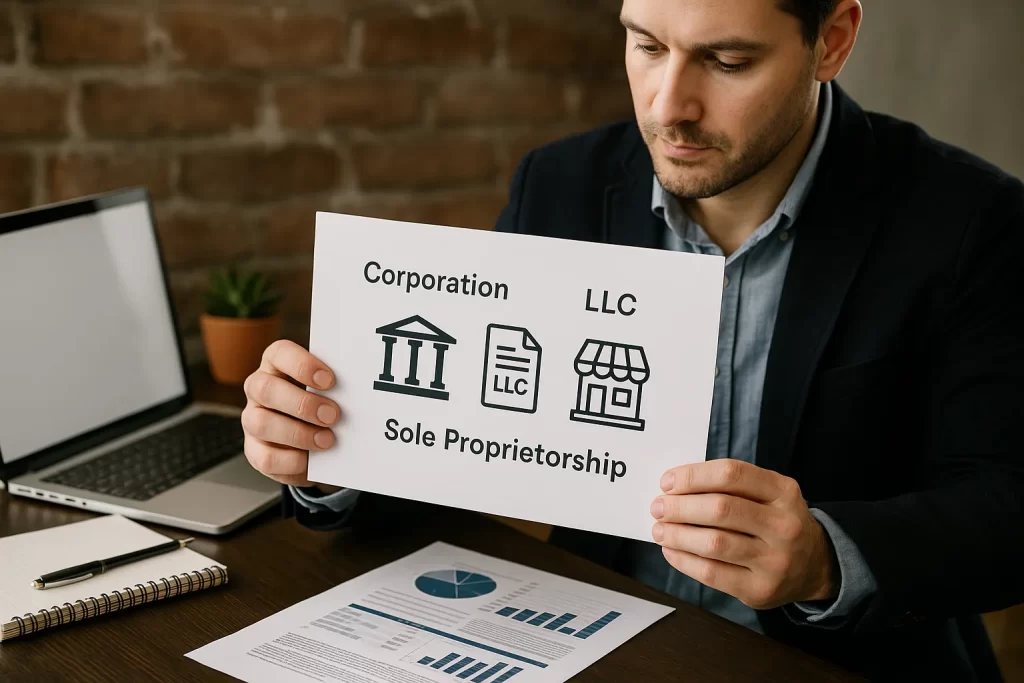Business. When starting a business, most entrepreneurs focus on the product, the brand, or the marketing strategy. But before you sell anything, there’s one foundational decision you need to make that will impact your taxes, legal liability, funding options, and even the way clients perceive your business: your legal structure.
Choosing the right business structure is not just about paperwork. It shapes how your business operates and grows. In this article, we’ll break down the key differences between a Sole Proprietorship, a Limited Liability Company (LLC), and a Corporation, so you can make a confident, informed decision from day one.
Why Business Structure Matters
Your business structure affects several critical areas, including:
- Legal liability: Are your personal assets protected if your business gets sued?
- Taxes: How much will you pay and how will you file?
- Credibility: Does your business name carry weight with clients or partners?
- Growth potential: Can you easily bring on investors or partners later?
Choosing the wrong structure can lead to higher taxes, legal risks, and unnecessary complexity. Let’s explore the three main options and how they compare.
Sole Proprietorship: The Simplest Path
A sole proprietorship is the easiest and most common way to start a business, especially for freelancers, consultants, and solopreneurs.
Key Features:
- You and the business are legally the same
- No need to register a separate entity (in most jurisdictions)
- Income is reported on your personal tax return
- You’re personally liable for all debts and legal issues
Pros:
- Minimal paperwork and cost to set up
- Full control over business decisions
- Simple tax filing (just add a Schedule C to your personal return)
- Good for testing an idea or running a small, low-risk business
Cons:
- No legal protection—your personal assets (home, savings) are at risk
- Limited options to raise capital
- Harder to build credibility or scale the business
Best for: Freelancers, side hustlers, and solo service providers just starting out.
LLC: Flexibility With Legal Protection
A Limited Liability Company (LLC) is a popular choice for small business owners who want protection without too much complexity.
Key Features:
- Separate legal entity from its owners (called “members”)
- Offers personal liability protection
- Can be taxed as a sole proprietor, partnership, or corporation
- Can have one or multiple owners
Pros:
- Protects your personal assets from lawsuits or business debts
- Flexible tax options (default pass-through or elect S-Corp taxation)
- Easier to manage than a corporation
- Adds credibility to your business name
Cons:
- Requires state registration and annual fees
- Slightly more complex than a sole proprietorship
- Rules vary by state or country
Best for: Small to medium-sized businesses looking for protection and flexibility.

Corporation: Structure Built for Growth
A corporation is a more complex legal entity, often used by larger companies or startups planning to raise capital.
There are two main types:
- C Corporation (C Corp): Separate from owners, taxed at the corporate level
- S Corporation (S Corp): Pass-through taxation, but with strict ownership rules
Key Features:
- Owners are shareholders
- Board of directors and corporate officers are required
- Formal structure and compliance required
Pros:
- Strongest protection for personal assets
- Can raise funds through stock issuance
- Unlimited growth potential
- Business lives on independently of the founder
Cons:
- More expensive and time-consuming to set up and maintain
- Requires more paperwork (annual meetings, minutes, etc.)
- May be subject to double taxation (C Corp only)
Best for: Startups, investors-backed businesses, or companies planning to scale aggressively.
Tax Implications: A Quick Comparison
| Structure | Tax Type | How You Pay Taxes |
|---|---|---|
| Sole Proprietorship | Personal income tax | Via your personal tax return |
| LLC (default) | Pass-through | Owners report profit/loss on personal return |
| LLC (S Corp election) | Pass-through with salary | Owners pay themselves salary + dividends |
| C Corporation | Corporate + dividend tax | Business pays corporate tax, then shareholders pay on dividends |
| S Corporation | Pass-through | Similar to LLC S Corp, but stricter rules |
Choosing the right tax treatment can save you thousands per year, especially once your profits increase. Consult a tax advisor to choose the best structure for your situation.
Liability and Asset Protection
Here’s where your decision really matters.
- Sole proprietors have no legal protection. If your business is sued, your house, savings, and car could be on the line.
- LLCs and corporations offer a legal shield between your business and personal life—as long as you maintain proper records and don’t mix finances.
If you’re in a high-risk industry (e.g., consulting, food service, retail), this protection isn’t optional—it’s critical.
Setup and Maintenance Requirements
Here’s what to expect with each:
Sole Proprietorship
- No formal filing (other than licenses or permits)
- Use your Social Security number or get an EIN
- Report income on personal taxes
LLC
- File Articles of Organization with your state
- Create an Operating Agreement (recommended)
- Pay annual fees and file reports
- Get an EIN for taxes and banking
Corporation
- File Articles of Incorporation
- Appoint a board of directors and corporate officers
- Hold regular meetings and keep minutes
- File annual reports and pay corporate fees
If you’re looking for simplicity, the sole proprietorship wins. If you want protection and professionalism, an LLC or corporation is a better long-term investment.
Changing Structures Later
Good news: You can change your structure as your business grows.
For example:
- Start as a sole proprietor, then form an LLC when revenue increases
- Form an LLC, then elect S Corp status for tax advantages
- Convert to a C Corporation if you’re bringing on investors
Just be aware that switching may involve fees, paperwork, and possible tax implications—so plan ahead and consult a professional.
How to Choose the Right Structure for You
Ask yourself:
- How much legal risk is involved in my business?
- Am I working alone or with partners?
- Do I plan to raise capital or stay small?
- What’s my expected income in year 1? In year 3?
- Do I want to keep taxes simple or optimize them?
- What’s my budget for setup and maintenance?
If you’re unsure, start with an LLC—it offers a strong balance of protection, flexibility, and credibility.
Final Thoughts
Choosing a legal structure is one of the most important business decisions you’ll make—but it doesn’t have to be overwhelming. You don’t need to know everything, and you don’t need to get it perfect on day one. What matters is that you choose a structure that fits your goals now—and one that can grow with you.
If you’re testing an idea with minimal risk, a sole proprietorship might be enough. If you want protection and professionalism, go with an LLC. If you’re building a business for scale, funding, or eventual sale, a corporation could be your best path.
Whichever you choose, make sure you separate your finances, follow the rules, and seek guidance when needed. Your legal structure sets the foundation for how you operate, grow, and protect everything you’ve worked hard to build.
Think long-term, plan smart, and treat your business like a business—right from the start.

